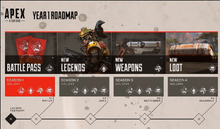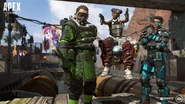Apex Legends is a free-to-play first-person shooter [1] video game developed by Respawn Entertainment and published by Electronic Arts. The game was announced on February 3, 2019, and unveiled and released for free on the following day.[2]
The game is a part of the Titanfall universe.
Story and Setting
Apex Legends takes place eighteen years after the events of Titanfall 2, in a region on the fringes of the Frontier known as the Outlands. The Frontier War is over, with the presumed defeat of the IMC a decade earlier. With neither the IMC nor the Militia to exert order upon the war-ravaged Frontier, the intervening time allowed the birth of a new competitive bloodsport known as the Apex Games.[3] The Apex Games are presumed to be founded and organized by Kuben Blisk, founder of the original Apex Predators mercenary unit and veteran of the Frontier War. The island of King's Canyon was a region formerly rich in resources, but it is now a dedicated bloodsport island home to the finest hunters and gladiators on the Frontier, the primary site of the Apex Games.[4]
Gameplay
Apex Legends is a first-person shooter, as the previous mainline games in the Titanfall series. Unlike the previous games, however, Apex Legends is an ongoing live service game with no single-player campaign or traditional multiplayer matchmaking. The game is a "hero shooter," where players play as discrete, individualized characters with their own designs, personalities, stories and special abilities. The primary mode of the game is a "battle royale," where players airdrop onto a remote island with no supplies on their person; they must scavenge equipment from the environment and fight against others in an ever-shrinking free-for-all battlefield, with the winner being the last man standing. The second mode is Arenas, a 3v3 mode where each squad can purchase weapons, weapon upgrades, heals, ordnance and abilities for a set amount of time before the wall that surrounds each team disappears and allows each team to fight to the death.
Players play as "Legends", hero characters similar to the Pilot or Titan classes found in Titanfall 2. Standard BR matches in Apex Legends are played in squads of three, fighting against nineteen other squads for a total of twenty squads - 60 players - in any given match. The winners - the game's Apex Champions - are the last squad standing after all other squads are eliminated. In Arenas, it is only two squads fighting each other, and the winners are the squad that manage to get two more consecutive wins than the other team.
Legends
Before a game begins, the three members of the squad are placed in random order and given a few seconds apiece to pick their Legend for the game; Legend choice within the squad is first-come-first-serve, and duplicate Legends are not allowed (two teammates cannot pick the same character). In BR, The last player to pick their Legend is the designated "Jumpmaster," who ultimately decides where and when the fireteam drops onto the map as a single unit, though they can pass the role onto another player during the drop phase. Arenas does not have a drop phase, and instead begins with your team being allowed to buy weapons and other items.
- Bloodhound - Technological Tracker (debut in pre-season)
- Gibraltar - Shielded Fortress (debut in pre-season)
- Lifeline - Combat Medic (debut in pre-season)
- Pathfinder - Forward Scout (debut in pre-season)
- Wraith - Interdimensional Skirmisher (debut in pre-season)
- Bangalore - Professional Soldier (debut in pre-season)
- Caustic - Toxic Trapper (debut in pre-season)
- Mirage - Holographic Trickster (debut in pre-season)
- Octane - High-Speed Daredevil (debut in season 1)
- Wattson - Static Defender (debut in season 2)
- Crypto - Surveillance Expert (debut in season 3)
- Revenant - Synthetic Nightmare (debut in season 4)
- Loba - Translocating Thief (debut in season 5)
- Rampart - Quick-witted Modder (debut in season 6)
- Horizon - Gravitational Manipulator (debut in season 7)
- Fuse - Explosives Enthusiast (debut in season 8)
- Valkyrie - Winged Avenger (debut in season 9)
- Seer - Ambush Artist (debut in Season 10)
Items
In BR, All competitors begin a match with no equipment on their person, special abilities aside. They must scavenge the field for weapons and ammunition, gear, ordnance and consumables. Items are laid out randomly across the map, so no two-item spawns will ever be the same between matches; that said, certain regions of the map are designated by what certain rarities of equipment they are likely to contain. Most items can be found lying out in the open, in supply bins, or in the rare Loot Tick hidden around the map. A couple of exceptional items, notably the gold-quality Kraber, Triple Take, and Prowler can only be initially found in a random supply drop. Items can also be scavenged from a defeated competitor's "death box," the remains of their inventory from the moment they were eliminated; a death box will glow the color of the highest rarity item in that box. All deathboxes disappear if there is nothing left in them and have no respawn banner. In Arenas, weapons are purchasable but some weapons will still appear in supply drops that appear mid game.
Weapons
There are currently 26 available weapons for the players to find and use, 19 at launch, with more planned to be added in the future. Most of the weapons make a reappearance from previous Titanfall games, while some of them are upgraded versions of older weapons or new ones in general. There are seven available classes of weapon type: assault rifles, submachine guns, light machine guns, marksman weapons, sniper rifles, shotguns, and pistols. They are also generally organized by what ammo type they use (light ammo, heavy ammo, energy ammo, shotgun shells or sniper rounds). Weapons can be cosmetically customized with their own skins a player chooses outside of the game; picking up another player's weapon lets you see the customization they use on their weapon if any.
Nearly all weapons can be modified on the fly with attachments, pieces of kit discovered in the field to improve a gun's functionality. These mods include barrels to reduce muzzle rise and at level 4 flash, stocks to shorten transition from one weapon to the next, larger magazines to increase ammo capacity, scopes to improve a gun's iron sights capability, and Hop-Ups which can change handling of a weapon in some way. When swapping a weapon for another found in the field, the game will show which mods, if any, will carry over to the new weapon.
Assault Rifles
- VK-47 Flatline
- Hemlok BF-R
- R-301 Carbine
- HAVOC Rifle (debut before Season 1)
Submachine Guns
- Alternator A-2
- R-99 SMG
- Prowler Burst PDW
- Volt SMG (debut in season 6)
Light Machine Guns
- X-55 Devotion MK.3
- M600 Spitfire
- L-STAR EMG (debut in Season 2)
- Rampage LMG (debut in Season 10)
Marksman Weapons
- G7 Scout
- D-2 Triple Take
- 30-30 Repeater (debut in season 8)
- Bocek Compound Bow (debut in season 9)
Sniper Rifles
- D-101 Longbow DMR
- X018 Kraber-AP Sniper Rifle
- Sentinel (debut in season 4)
- Charge Rifle (debut in season 3)
Shotguns
Pistols
Ordnance
Attachments
- Main article: Weapon attachments (Apex Legends)
Gear
- Main article: Gear (Apex Legends)
Consumables
- Main article: Consumables (Apex Legends)
Armour and Health
Any given Legend's special abilities aside, there are three types of armour a player can find and equip: body armour, a helmet, and a knockdown shield. Body armour improves your character's overall health and guards against damage. A helmet provides protection against headshots. A knockdown shield is used when a character is downed, letting them put up a small shield to provide forward protection against incoming damage while they crawl to safety. All three armour types come in varying levels of quality, with higher quality armor providing greater levels of protection. Body armour - even when fully depleted - can be restored by using shield cells of assorted sizes, though this takes time.
When taking damage, damage applies to armor first. When the armor is fully depleted, characters take damage directly to their health. Health can be recovered with syringes or medkits scavenged from the field, or certain abilities a character may have, though this takes time. Like most battle royales, when a character takes enough damage, they are "downed" or "knocked down," leaving them crawling on the ground and mostly defenceless; if a teammate is still standing, they can pick up their downed teammate with a revival move and get them back into the fight with limited health (if a character is carrying a particular gold-quality knockdown shield, they can use its special ability to pick themselves up, though this takes longer).
If a downed character takes enough additional damage, they are "dead" and out of play. However, unlike most other battle royales, death is not necessarily the end. If a character is killed and a teammate is still active, they have 90 seconds to get to the killed character's death box (the remains of their inventory) and recover their banner. Once a banner is recovered, the surviving teammate(s) can travel to a respawn beacon and use the banner. If successful, the dead character will be fully revived and return to the fight on that respawn beacon via dropship, albeit with an empty inventory. In Arenas, this is different as once a player is down, they are out and cannot respawn until the next round starts. Their loot will not appear in a deathbox like in BR.
If all members of a squad are downed or killed at the same time, the squad is eliminated from the game, meaning their game is over entirely. The members can either spectate other players still in the game or exit the game and return to the main menu to start over.
Inventory
Players have limited inventory with which to carry any items or equipment scavenged from the field. A character can only carry up to two weapons at a time, each weapon with its own aforementioned set of modifications it can equip. They have one designated slot apiece for a helmet, body armour, knockdown shield and backpack - the latter expands their inventory by providing additional inventory slots. As mentioned previously, the aforementioned equipment types come in varying quality, with higher quality gear providing improved protection or carrying capacity, and the rarest gold-level equipment providing not only the best protection/capacity but also exclusive special abilities. Their inventory consists of discrete slots with which they can carry other miscellaneous items, like syringes and medkits, shield cells, various ammunition types, ordnance, and unequipped weapon mods. They cannot carry spare weapons or duplicate pieces of armour. Inventory management will be crucial to success, as a player will have to decide what items are more valuable to them at any given moment.
Progression & Monetization
Apex Legends is a free-to-play title, meaning there is no cost to download the game and start playing immediately. There are presently four currencies available within the game:
- Crafting Metals, with which to directly get most cosmetics in the game
- Legend Tokens, with which to purchase new Legends and more exclusive cosmetics
- Apex Coins, the premium real-money currency with which to purchase anything in the game
- Heirloom Shards, used to purchase heirlooms for different legends
The game also features cosmetic loot boxes called Apex Packs. Opening an Apex Pack gives a player three random items of varying rarity, ranging from currency to any sort of customization, like weapon skins or Legend items (skins, banner pieces, quips, finishing moves, etc.). Apex Packs can be purchased directly with Apex Coins. Completing a game, win or lose, will award experience points (XP) that go towards a player's account level. When the account levels up, they receive rewards including free currency and Apex Packs. Sources of XP from a match include:
- Length of time survived in a match
- Damage dealt and kills secured
- Teammates revived or respawned
- Winning a match (or at least finishing in the top 3 squads)
- Being the kill leader and/or claiming the bounty on the kill leader (the player with the most secured kills that game; can be identified by looking at banners dotted around the map)
- Being on a champion squad or claiming the bounty on the champion (before the match begins, the game's champion [highest-performing player in an immediately previous game] and their squad are revealed to the lobby)
- Playing a match as part of a premade squad (you receive an XP bonus just for playing with friends)
A seasonal Battle Pass can be purchased with Apex Coins when available and can be leveled up separate from a player's account level by playing games and earning experience. Leveling the Battle Pass grants additional currencies, Apex Packs, and season-exclusive cosmetics.[5]
Development
Work on the next Titanfall game started following the release of Titanfall 2 in 2016, with the main development team being shifted to the new project following the release of the Postcards From the Frontier update. In November 2017, Vince Zampella announced that Respawn Entertainment is continuing to work on a new Titanfall project.[6] In an interview with Gamespot, Vince Zampella confirmed that several Titanfall projects were in the works and that the studio is "heavily invested" in the franchise as a whole.[7] In November 2018, a statement released by Electronic Arts indicated that Respawn Entertainment will release multiple games in fall 2019, one of which may be a new Titanfall game and the other Star Wars Jedi: Fallen Order.[8][9] Apex Legends was revealed to be one of these projects in February 2019.[2]
Apex Legends took form during experimentation following Titanfall 2's release, when the developers experimented with the battle royale game mode. It was quickly decided that it wouldn't simply be a gamemode by itself and was instead transformed into its own game entirely. Respawn intends to support the game as a live service game, with "seasons" consisting of content updates every three months, with the first scheduled to start in March 2019. Because of this commitment, Titanfall 3 is not currently in development.[10]
Early builds of Apex Legends contained the parkour and Titan elements core to prior games in the series with early builds even going so far as to contain a triple jump ability, but these features were removed during development as they made combat unpredictable and hard to comprehend.[10] Titans were also present in early builds of the game as a power up ability but were removed due to Respawn not wishing to make the Titans feel like they "were made out of paper, a wet cardboard bag" and defeat the intention of them being a power fantasy.[10] Despite the removal of several core features to the franchise thus-far, Respawn elected to set the game within the Titanfall world due to a desire to flesh out the world away from the black-and-white conflict between the Interstellar Manufacturing Corporation and Frontier Militia, instead of focusing on other colourful characters and their stories.[10]
Respawn decided to forego a heavy marketing campaign for Apex Legends, due to the potential for perceived fan backlash due to several unfavourable factors such as the removal of classic Titanfall elements, the company's acquisition by EA, the game being free-to-play with purchasable loot boxes and the game not being the rumured Titanfall 3. Instead, the company decided to let the game speak for itself by announcing and releasing it within the same day.[10] Producer Drew McCoy also expressed a wish to stay open and transparent about Apex Legends, with a roadmap of the game's post-launch features being shown in the launch-day stream.
Post-launch support

A year one roadmap of the game's post-launch support.
Apex Legends is expected to receive long-term post-launch support by the Titanfall 2 development team within Respawn Entertainment consisting of new Legends, weapons, cosmetics and more. Like many other games, content will be divided into seasons consisting of roughly three months, and a battle pass to be implemented following the launch of Season 1 in March 2019.
The first piece of new content, the Havoc energy rifle, was released in February 2019.
The game's first season, Wild Frontier, began on March 19, 2019. It launched with a new legend - Octane - and the season 1 Battle Pass.[5]
Reception
Apex Legends got "generally favorable" reviews on Metacritic receiving a metascore of 88/100 on both PC[11] & Xbox One[12] and 89/100 on PS4.[13]
Gallery
Logo
Images
References
- ↑ 1.0 1.1 Geoff Keighley on Twitter
- ↑ 2.0 2.1 Vince Zampella on Twitter
- ↑ Apex Legends Overview - Official EA Website
- ↑ Apex LegendsGameplay Deep Dive Trailer
- ↑ 5.0 5.1 Apex Legends Battle Pass - Official Site
- ↑ Respawn Official Website - A Letter From Vince
- ↑ Gamespot - Titanfall Boss Discusses New Spinoff, Moving On From Titanfall 2, And The Franchise's Future
- ↑ IGN - Titanfall 3 and Star Wars Jedi: Fallen Order could be out by Late 2019
- ↑ EA Statement - Page 7
- ↑ 10.0 10.1 10.2 10.3 10.4 Eurogamer - "The world thinks we're making Titanfall 3 and we're not - this is what we're making."
- ↑ Metascore for Apex Legends on PC Metacritic, Retrieved February 28, 2020
- ↑ Metascore for Apex Legends on Xbox OneMetacritic, Retrieved February 28, 2020
- ↑ Metascore for Apex Legends on PS4Metacritic, Retrieved February 28, 2020
External links
| Titanfall Games | |
|---|---|
| Main Series | Titanfall • Titanfall 2 |
| Spinoff Titles | Apex Legends |
| Mobile Applications | Titanfall Companion • Titanfall: Assault |
| Cancelled Games | Titanfall: Frontline • Titanfall Online • Titanfall Legends |




